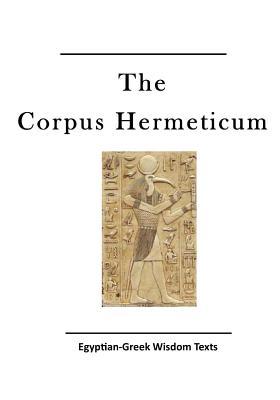The Corpus Hermeticum
The Corpus Hermeticum are the core documents of the Hermetic tradition
Hermes
An Introduction to the Corpus Hermeticum by John Michael Greer
The Hermetica are Egyptian-Greek wisdom texts from the 2nd and 3rd centuries AD, which are mostly presented as dialogues in which a teacher, generally identified as Hermes Trismegistus ("thrice-greatest Hermes"), enlightens a disciple. The texts form the basis of Hermeticism. They discuss the divine, the cosmos, mind, and nature. Some touch upon alchemy, astrology, and related concepts.
The fifteen tractates of the Corpus Hermeticum, along with the Perfect Sermon or Asclepius, are the foundation documents of the Hermetic tradition. Written by unknown authors in Egypt sometime before the end of the third century C.E., they were part of a once substantial literature attributed to the mythic figure of Hermes Trismegistus, a Hellenistic fusion of the Greek god Hermes and the Egyptian god Thoth.
This literature came out of the same religious and philosophical ferment that produced Neoplatonism, Christianity, and the diverse collection of teachings usually lumped together under the label "Gnosticism" a ferment which had its roots in the impact of Platonic thought on the older traditions of the Hellenized East. There are obvious connections and common themes linking each of these traditions, although each had its own answer to the major questions of the time.
The treatises we now call the Corpus Hermeticum were collected into a single volume in Byzantine times, and a copy of this volume survived to come into the hands of Lorenzo de Medici's agents in the fifteenth century. Marsilio Ficino, the head of the Florentine Academy, was pulled off the task of translating the dialogues of Plato in order to put the Corpus Hermeticum into Latin first. His translation saw print in 1463, and was reprinted at least twenty-two times over the next century and a half.
The treatises divide up into several groups. The first (CH I), the "Poemandres," is the account of a revelation given to Hermes Trismegistus by the being Poemandres or "Man-Shepherd," an expression of the universal Mind. The next eight (CH II-IX), the "General Sermons," are short dialogues or lectures discussing various basic points of Hermetic philosophy. There follows the "Key" (CH X), a summary of the General Sermons, and after this a set of four tractates - "Mind unto Hermes," "About the Common Mind," "The Secret Sermon on the Mountain," and the "Letter of Hermes to Asclepius" (CH XI-XIV) - touching on the more mystical aspects of Hermeticism. The collection is rounded off by the "Definitions of Asclepius unto King Ammon" (CH XV), which may be composed of three fragments of longer works.
The Perfect Sermon
The Perfect Sermon or Asclepius, which is also included here, reached the Renaissance by a different route. It was translated into Latin in ancient times, reputedly by the same Lucius Apuleius of Madaura whose comic-serious masterpiece The Golden Ass provides some of the best surviving evidence on the worship of Isis in the Roman world. Augustine of Hippo quotes from the old Latin translation at length in his City of God, and copies remained in circulation in medieval Europe all the way up to the Renaissance. The original Greek version was lost, although quotations survive in several ancient sources.
The Perfect Sermon is substantially longer than any other surviving work of ancient Hermetic philosophy. It covers topics which also occur in the Corpus Hermeticum, but touches on several other issues as well - among them magical processes for the manufacture of gods and a long and gloomy prophecy of the decline of Hermetic wisdom and the end of the world.
